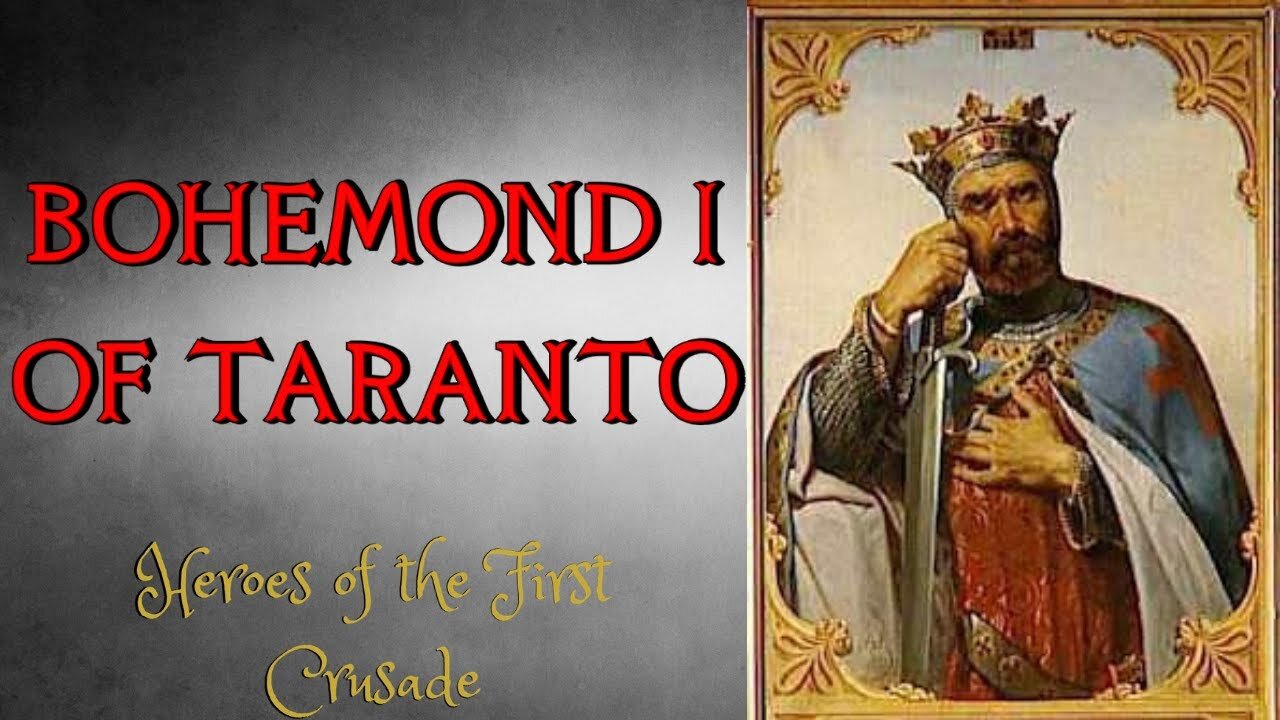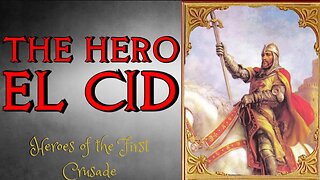Premium Only Content

Bohemond I Prince of Antioch - The Fiery Crusader King
Bohemond I (c. 1054 – 3 March 1111) was the Prince of Taranto from 1089 to 1111 and the Prince of Antioch from 1098 to 1111. He was a leader of the First Crusade, which was governed by a committee of nobles. The Norman monarchy he founded in Antioch arguably outlasted those of England and of Sicily.
In 1097, Bohemond and his uncle Roger I of Sicily were attacking Amalfi, which had revolted against Duke Roger, when bands of crusaders began to pass on their way through Italy to Constantinople. It is possible that Bohemond had religious reasons for joining the First Crusade. It is equally likely that he saw in the First Crusade the chance to gain a lordship in the Middle East. Lilie details that Bohemond's "father's second marriage deprived him of future prospects," in Norman Italy. While he was well known as a warrior, Bohemond's lordship in Italy was small. Geoffrey Malaterra bluntly states that Bohemond took the Cross with the intention of plundering and conquering Greek lands. Another reason to suspect Bohemond's religious zeal is the supposed embassy Bohemond sent to Godfrey of Bouillon, a powerful Crusade leader, asking him to join forces to sack Constantinople. While Godfrey declined his offer, taking Constantinople was never far from Bohemond's mind, as seen in his later attempt to take over the Byzantine Empire.
He gathered a Norman army, which would have been one of the smaller crusade forces with 500 knights and about 2,500-3,500 infantry soldiers, alongside his nephew Tancred's force of 2,000 men. What contributed to the Norman army's reputation as a great fighting force was their experience fighting in the East. Many Normans had been employed as mercenaries by the Byzantine Empire. Others like Bohemond had experience fighting the Byzantines and Muslim groups in the East fifteen years prior with Robert Guiscard. Bohemond crossed the Adriatic Sea to Constantinople along the route he had tried to follow in 1082–1084 when attacking the Byzantine Empire. He was careful to observe the correct attitude towards Alexios along this route, which was mainly keeping his soldiers from plundering Byzantine villages en route to Constantinople.
When he arrived at Constantinople in April 1097, he took an oath of homage to Emperor Alexios, which he demanded from all crusade leaders. It's not clear what exact negotiations Bohemond and Alexios made concerning Bohemond governing part of the Eastern Byzantine Empire Alexios hoped the crusaders would reclaim. Alexios had no reason to trust Bohemond enough to give him a position at the time, but hinted that he could get a position by proving his loyalty. Bohemond's best chance at gaining a favorable position was to be loyal to Alexios, which he attempted to prove while the crusaders were camped around Constantinople. Bohemond, proficient in Greek, was able to be a conduit between Alexios and the crusade leaders. Bohemond also attempted to prove his loyalty by convincing other crusade leaders to take the oath of homage to Alexios.
From Constantinople to Antioch, Bohemond was a stand out among the leaders of the First Crusade. Bohemond's reputation as an effective strategist and leader came from his fighting experience in the Balkans when he took charge of his father's army against Emperor Alexios (1082–1085). There Bohemond became familiar with various Byzantine and Muslim strategies, including an encircling strategy used by Turkish forces at the siege of Nicaea. Mounted archers would encircle the crusader force, who would be unable to retaliate using close combat weaponry. Bohemond's familiarity with this Eastern strategy allowed him to adapt quickly leading to crusader victories through Antioch.
The Emperor's daughter, Anna Comnena, leaves a portrait of him in her Alexiad. She met him for the first time when she was fourteen and was seemingly fascinated by him, leaving no similar portrait of any other Crusader prince. Of Bohemond, she wrote:
#CrusadesHistory #MedievalHistory #EuropeanHistory
-
 8:47
8:47
Parry This
1 year agoA Biography of Rodrigo Diaz De Vivar (The Hero El Cid)
831 -
 LIVE
LIVE
Wendy Bell Radio
5 hours agoThe Left Is Wrong About Everything
12,664 watching -
 29:05
29:05
CatfishedOnline
18 hours agoThe Real Jennifer Aniston or Another Romance Scam?
5.94K5 -
 34:44
34:44
LFA TV
5 days agoMIRACLES DO HAPPEN!
10.3K2 -
 16:43
16:43
T-SPLY
3 hours agoCNN Panel Member Forgets Donald Trump Runs The Military
7.34K11 -
 31:13
31:13
World Nomac
22 hours agoAMERICAN visits IRAN for 10 days (this is what I found) 🇮🇷
7.25K1 -
 1:03:55
1:03:55
The Tom Renz Show
9 hours agoBongino In At FBI & Is Factory Meat Made of Cancer?
15.1K4 -
 7:03
7:03
Dangerous Freedom
17 hours agoBest Tiny Budget Red Dot? (Honest Review - Gideon Optics Judge).
4.46K1 -
 10:32
10:32
ariellescarcella
13 hours ago"Being Trans Made Me Gay" : Hormone Science Explained
7.15K9 -
 1:02:09
1:02:09
PMG
10 hours ago $0.14 earnedTrump to BAN the COVID Vaxx?! mRNA in Your Organic Meat?! w/ Kim Bright
4.13K3